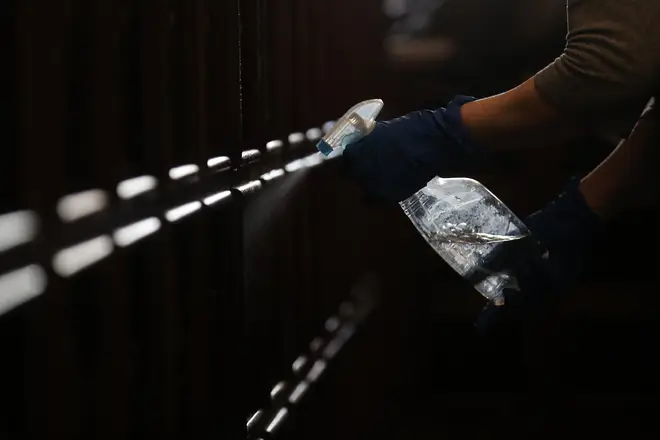
Iain Dale 10am - 1pm
30 March 2020, 15:59

In the age of social media, a number of coronavirus myths have been spread around the country - but which ones are fake?
The worldwide spread of Covid-19 has led to a huge spread of misinformation around the subject.
False myths and advice have circulated on social media sites including Facebook, WhatsApp and Instagram, despite technology companies attempts to curb the spread.
With that in mind, LBC News reveals the most commonly believed myths about Covid-19 currently circulating.
According to a recent YouGov poll, one in five Brits think the coronavirus is "just like the flu".
20 per cent of those surveyed believe this is "definitely true".
Despite some similarities in symptoms, including fever, aches and pains and a sore throat, the novel virus is not the same as flu.
For one, the mortality rate of coronavirus is believed to be higher than that of seasonal flu, which is around 0.1 per cent.
The reproduction rate of Covid-19 is also higher than that of flu, with each sufferer infecting between two and three other people, compared to 1.3 new people for every flu patient.

A quarter of Brits surveyed think that vodka can probably be used as hand sanitiser to kill Covid-19.
A further 7 per cent think that this is definitely true.
In reality, vodka does not have a high enough alcohol content to kill microbes and be effective as a hand sanitiser.
Despite this, even those in power, such as The President of Belarus, Alexander Lukashenko, have claimed vodka and saunas can cure coronavirus. He advised Belarusians to drink 50ml of vodka a day to ward off the virus.
One fifth of those surveyed believe that coronavirus originated in a Chinese lab.
A dangerous conspiracy theory that has been circulating on social media says that the coronavirus originated in a level 4 (the highest biosafety level) research laboratory in Wuhan.
Despite UK media reporting this story, there is no evidence whatsoever to substantiate it.
However, the current scientific consensus is that the virus originated in bats, before being passed on to humans.

Doctor shows how effective soap is with viruses
One in six Brits believe that if you can hold your breath for 10 seconds you don’t have coronavirus.
This is likely to have come from a widely shared chain message which has been circulating on social media containing a raft of fake medical advice.
There is no evidence to suggest that being able to hold your breath indicates there is no infection, as the ability to do this will vary from person to person even when they’re healthy.
Around one in six also believe that drinking water every 15 minutes will flush out the virus.
While drinking a lot of water is always good for the body, you can’t prevent coronavirus by simply keeping your throat moist.
This is because the main method of transmission for coronavirus is droplets landing on surfaced being passed on, not the virus being stuck in your throat.
The false message is thought to have originated in the US with a false attribution to Stanford University, while one UK version claims to contain information that was shared only with NHS staff.
It also recommends drinking hot drinks to prevent infection, which is also untrue.
Nearly three in ten Brits also believe coronavirus can live on surfaces for up to a month, which is scientifically unlikely.
The New England Journal of Medicine recently published a study which showed that the virus could live at most on some surfaces for up to three days.